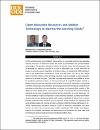Open Education Resources and Mobile Technology to Narrow the Learning Divide
Abstract
As the world becomes more digitized, there will be an increasing need to make available learning resources in electronic format for access by information and communication technologies. The question education will face is whether these learning resources will be available for learners to access at no cost or affordable cost so that there will be equity in access by anyone regardless of location, status, or background. With initiatives such as the Millennium Development Goals and Education For All by the United Nations (United Nations, 2011) learning materials must be available as open education resources to achieve the goals. Currently, most learning materials are available at a cost for people to purchase to learn, or they have to travel to a specific location (school or library) to access learning materials. In some parts of the world, especially in developing countries, these costs are prohibitive, preventing learners from achieving a basic level of education so that they can be productive in society and improve their quality of life (Bhavnani et al., 2008). Some would say that people in remote locations and developing countries do not have computers to access learning materials. It is true that many do not have desktop or laptop computers to access learning materials, but they have mobile devices and are now obtaining tablets with wireless capability to allow them to access learning materials from anywhere and at any time. These countries are bypassing the wired desktop stage and moving directly to wireless mobile technology (Bhavnani et al., 2008). Storing open education resources (OER) in electronic repositories will allow learners to access the resources using mobile technology. With mobile technologies, learners can complete coursework and assessments from anywhere and send their work to their tutors electronically and receive feedback (GSMA, 2011).
Collections
- Computer Science & Engineering [2484 items ]


